No Results Found
The page you requested could not be found. Try refining your search, or use the navigation above to locate the post.

You may not be aware but in addition to allowing the slaughter of horses within Canada for human consumption — Canada allows for the live transport of horses to other countries for the purpose of slaughter.
Make no mistake about it, the way in which horses destined to be slaughtered are transported, in no way shape or form resembles the great care, when being shipped by air shown to pet or show or sport horses – including racehorses.
Horses destined for slaughter are crammed in crates, often 3 or even 4 in crates designed for one horse – but don’t take our word for it – watch the full CTV W5 report here or a shorter 2 minute video below.

BELOW you will find a 2 minute video that includes a shipper freely admitting that regulations limiting the length of time horses can be in transport without food, water or veterinary care was recently broken – with permission of the CFIA – the federal agency charged with protecting the safety of livestock being transported within and out of Canada.


We are 100% volunteer & crowdfunded.
0% goes towards salaries. Yes, ZERO.
You do NOT need a PayPal account to donate through PayPal.
You may make a one time donation or if you prefer set up a monthly donation.
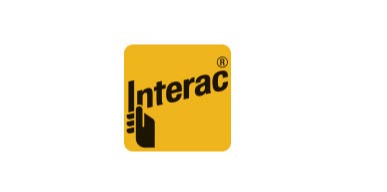
EMAIL for e-transfer or PayPal:
donations@banhorseslaughter.com
If asked for a security answer please use horses


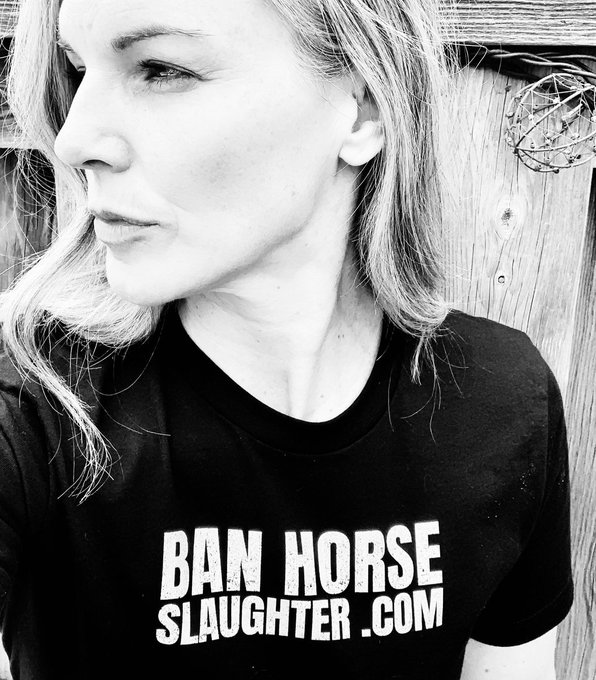
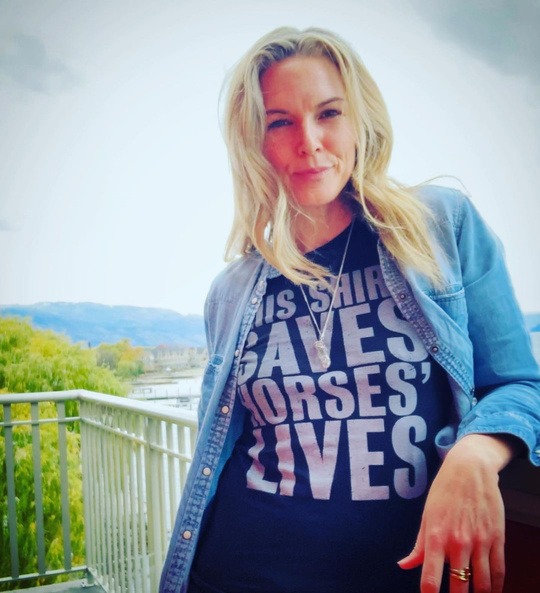
The page you requested could not be found. Try refining your search, or use the navigation above to locate the post.
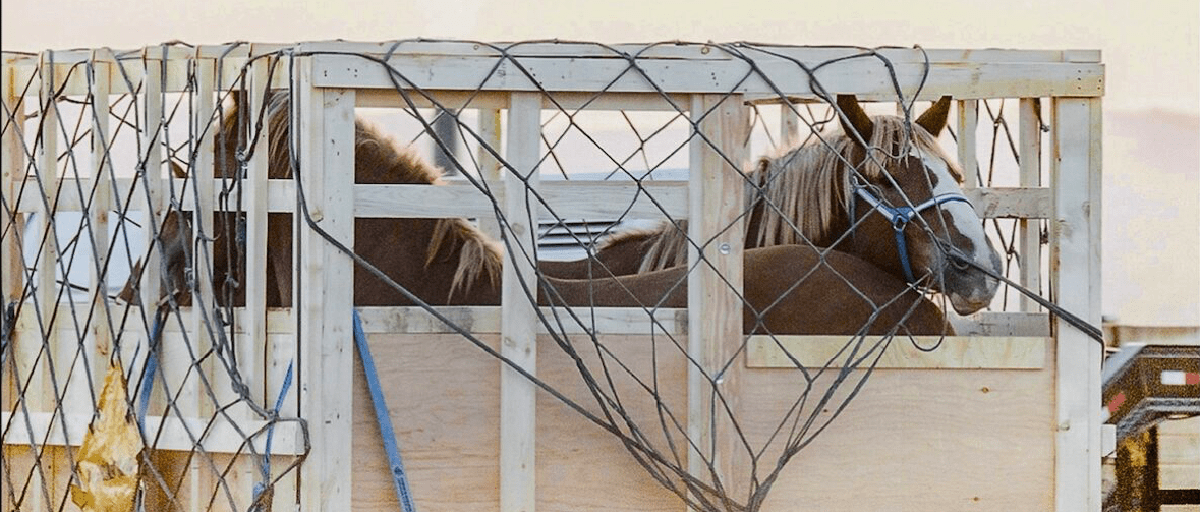
The Honourable Lawrence MacAulay, the current Minister of Agriculture and Agri-Food, has the power to end the inhumane export of horses by air for slaughter by enacting a regulatory amendment.
Help spread the word by sharing this email campaign with friends and family! You can also support the cause by donating—your contribution will help fund advertising efforts to raise awareness and push for change. Every action makes a difference!

Remember the petition that we shamelessly flogged and promised had clout because it was sponsored by a Member of Parliament?
Well it closed, and thanks to you, it’s been presented in Canadian Parliament and again thanks to you and your support it’s brought about all kinds of coverage in major publications (Globe and Mail, Toronto Star, Vancouver Sun, The National Post) and on for example CBC THE NATIONAL, the CTV & GLOBAL networks — and now the Minister of Agriculture and Agri-Food (Canada) has responded – in writing.
Here’s part of what she has to say…
Horses are then transported by air to the importing country, notably Japan, and horses that are exported from Canada for slaughter are subject to the same regulations as horses shipped for other uses, such as breeding or international sporting events. For every shipment, all participants are required to meet all Canadian and international standards. [Read her full response here.]
Really? Seriously?
Do the wooden crates used to transport horses from Canada to Japan (and other markets) for slaughter look anything like the carefully crafted metal, padded "stalls" used to transport show and other horses by air?
Does how horses destined for slaughter are loaded onto flights look anything like how show and other horses are carefully led onto flights?
Seriously? Minister Bibeau, please watch the short videos that show otherwise.
All one has to do is look at footage provided by the CBC National News, or footage from CTV's W5 expose/documentary to realize that is NOT the case.
In no way shape or form does the way in which horses are transported to slaughter resemble how horses exported for other purposes are handled.
AND as covered recently on the CBC National News and as freely admitted by those who transport horses from Canada to Japan for slaughter...
(AGAIN, watch the CBC National news coverage)
National and international shipping regulations ARE being broken. Again, listen to the shipper of horses on the CBC National News admit that the CFIA is turning a blind eye.
How dare the Minister say in her response that the poor draft horses are subjected to the same requirements that all horses being shipped internationally by air are!
Are other horses being shipped in rickety wooden containers, unsegregated? NO!!
They are shipped separately from one another in proper horse containers which are usually made of metal and are very well padded.
And in the recent shipment in Dec. departing from Winnipeg, transport times well exceeded the legislated required maximum of 28 hrs without food, water and rest, leading to the downing of 3 horses on arrival in Japan.
There were no consequences to all involved. Simply the “cost of doing business” in their eyes!
And the newly implemented animal transport regs now only require that incompatible animals be segregated.
It is impossible for any CFIA vet to determine compatibility on the spot at the time of loading the horses.
Regardless, compatibility can quickly change due to the stress of the flight.
I wrote the Minister well over a month ago and have yet to receive a response from her.
So much for her engaging in consultation with all concerned parties.
This is despite my meeting with two Liberal MPs here in Brampton.
My question remains, why is she even consulting anyone?
The PM campaigned on banning these shipments and he issued a directive to the Minister to do so in his mandate letter dated Dec. 16, 2021. Yet these inhumane shipments continue, and horses continue to be injured on these flights.
Canadians should be outraged!!!


Imagine this: Cute little dogs being bred on farms for the sole purpose of being shipped overseas to be slaughtered and fed as a delicacy to the rich.
But before they reach their final destination, before they are killed and butchered, they are stuffed into small wooden crates (up to four animals crowded in the tiny enclosure) for the often bumpy, terrifying 8,000 km journey – going without food and water for up to 25 to 30 hours.
Imagine if Canadians found out this practice was taking place.
We would collectively go ballistic and demand it be immediately shut down. And any government that hoped to get re-elected would act instantly. They wouldn’t take months or years. It would be shut down overnight. [read the full article here...]





The page you requested could not be found. Try refining your search, or use the navigation above to locate the post.

The Honourable Lawrence MacAulay, the current Minister of Agriculture and Agri-Food, has the power to end the inhumane export of horses by air for slaughter by enacting a regulatory amendment.
Help spread the word by sharing this email campaign with friends and family! You can also support the cause by donating—your contribution will help fund advertising efforts to raise awareness and push for change. Every action makes a difference!
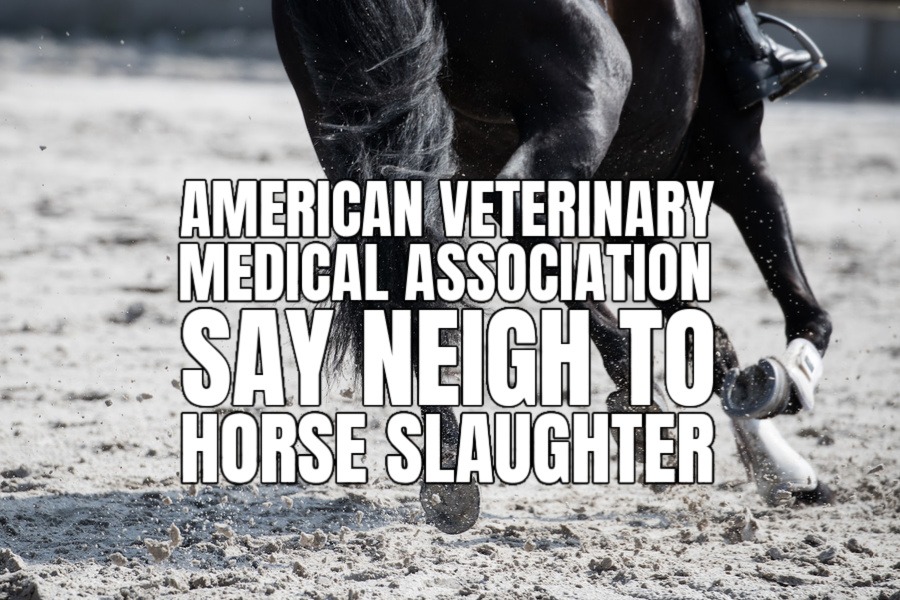
Quotes are taken from a review published January 26, 2023, titled
A review of horses sent to slaughter for human consumption: impact of horsemeat consumption, residual banned drugs, and public health risks
…the exportation of American horses across both borders for the sole purpose of slaughter for human consumption must end.
Surely if more people in North America and the rest of the world realized that horses and other equines are slaughtered for human consumption in Canada and Mexico, the slaughter of all equines would be banned.
Horses slaughtered in Canada and Mexico include horses exported in leg-breaking trailers from the USA for as long as 3 days without food or water or vet care.
The horses slaughtered include a small percentage raised specifically for meat but the vast majority are pet horses, rodeo and racing “stock”.
In other words, horses that have at the very least been treated with wormers and, in many cases, other drugs that are not meant ever to enter the human food chain.
And before you think it doesn’t matter to you because you don’t eat horsemeat…
In 2015 a study at the University of Guelph, sponsored by the Canadian Food Inspection Agency found that horsemeat shows up on Canadian grocery store shelves marked as other than horsemeat.
In other words, if you are Canadian and eating meat you may be eating toxic horsemeat without knowing it.
Perhaps even more disturbing the Canadian Food Inspection Agency was quoted as saying, they were NOT surprised horsemeat is being sold in Canada marked as other than horsemeat.
Food prices have risen dramatically since 2015, so it makes sense that food fraud may also be on the rise. Purchasing a horse not raised for slaughter, a discarded pet or racehorse for example is far cheaper than buying beef cattle raised under strict protocols.
Keep reading to learn why millions of pounds of horsemeat produced in Canada is toxic.
Previous work showed that 18 Thoroughbred racehorses purchased by rescues that would have otherwise been sold for export for the sole purpose of slaughter to produce meat for human consumption were administered [highly toxic to humans] phenylbutazone.
“Horses are prone to developing musculoskeletal injuries due to their various roles including pleasure riding, hunter/jumper, racing, and other performance-type work.
The most common drug to treat musculoskeletal injuries in horses is phenylbutazone.
Based on the annual sales of phenylbutazone [commonly known as BUTE] in the United States, our group estimated that every adult horse receives at least 1 dose of phenylbutazone during its lifetime.
There are 500 pounds of dressed horsemeat per horse.
The number of American horses exported to Canada for slaughter in 2019 was 10,486; this translates into 5,243,000 pounds of dressed horsemeat.”
Given that the US Department of Agriculture does not have a system to remove horses administered banned substances from the slaughter pipeline, more than 5,000,000 pounds of dressed horsemeat sent to the EU and non-EU countries in 2019 were likely contaminated with banned substances.
“The FDA considers American horses as companion animals and as such all approved drugs can be administered.
The “administration” of phenylbutazone or any other banned substance is not allowed in food-producing animals.
Both EU and non-EU governments have published a list of banned drugs and drugs with withdrawal periods.”
The magnitude of the issue is further complicated by the fact that Canadian residue testing represents less than 1% of the total carcasses tested.
You can read the full review from the American Veterinary Medical Association here.



The page you requested could not be found. Try refining your search, or use the navigation above to locate the post.

The Honourable Lawrence MacAulay, the current Minister of Agriculture and Agri-Food, has the power to end the inhumane export of horses by air for slaughter by enacting a regulatory amendment.
Help spread the word by sharing this email campaign with friends and family! You can also support the cause by donating—your contribution will help fund advertising efforts to raise awareness and push for change. Every action makes a difference!
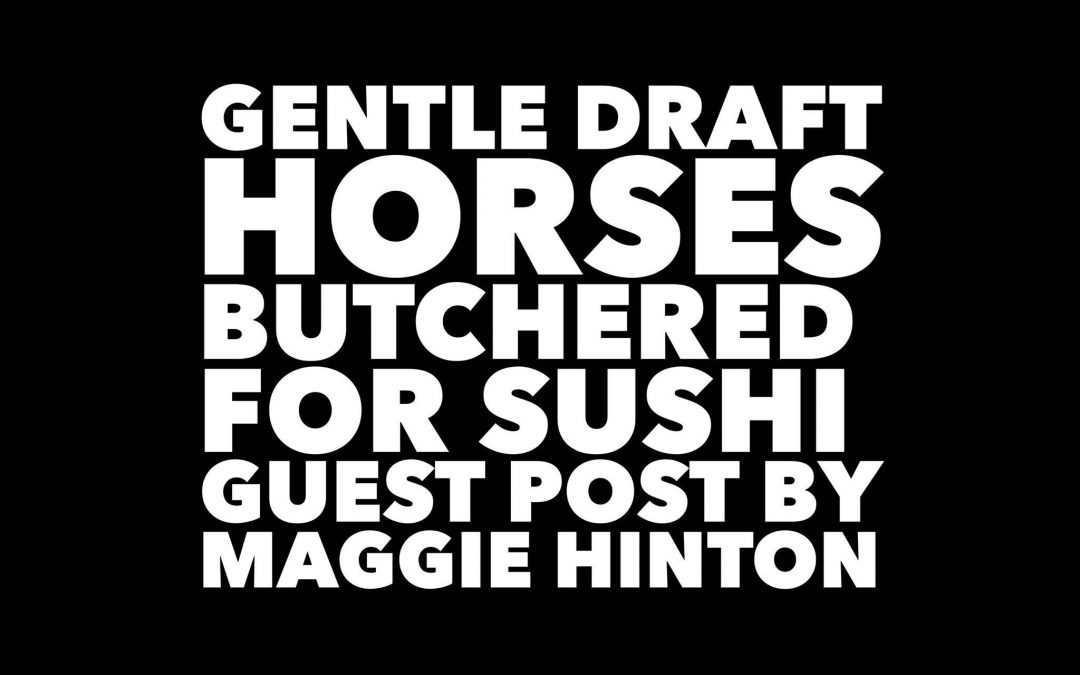
Very special thanks to Maggie Hinton of Canadians Against Horse Abuse who writes:
Many Canadians and Americans do not realize that even though horse slaughter is currently not allowed in the United States, horses from both countries are slaughtered in Canada for human consumption.
Additionally, since 2012 draft horses have been shipped by air from Canada to Japan to be slaughtered for consumption, including for sushi.
The Canadian Meat Council, a member of the *Canadian Agri-Food Trade Alliance (CAFTA) coalition worked on a **deal with the Canadian Government and Japan to eliminate tarriffs on the export of horses from Canada to Japan for slaughter.
Since that time individuals and organizations including the Canadian Horse Defence Coalition(CHDC) have been lobbying the Canadian government to stop the shipment of live horses for slaughter to Japan.
CHDC issued the first press release on the subject of live horse exports to Japan for slaughter in 2012, and were quick to point out how shipping horses live to Japan is economically feasible, because the CFIA is turning a blind eye to their own shipping regulations…
“Footage taken of Alberta horses being shipped live to Japan for slaughgter shows that the Canadian Food Inspection Agency (CFIA) is violating their own standards set forth in the Health of Animals Regulations. The regulations prohibit the transportation of all animals under conditions that would expose the animals to undue injury or suffering.”
More recently CHDC sued the Canadian Food Inspection Agency, which is a Canadian Federal Government agency for blatantly ignoring international shipping regulations.
So again, like many others, you may be wondering how shipping horses by air to Japan could possibly be economically feasible.
Eliminating tariffs helped keep costs down. In addition, kill buyers and producers get away with keeping horses in crowded, wet, dirty, cold, feedlots without adequate shelter, including in winter — and we all know how cold Canadian winters can be. Horses are transported in crowded trailers to the airport.
Then because the Canadian Food Inspection Agency turns a blind eye, horses are shipped by air to Japan in flimsy, wooden crates, with as many as possible crammed into each crate. (Shipping regulations allow for one draft horse per crate, but that regulation is consistently ignored.)
When shipping by air, horses are denied basic nutrition and water, pushing the limit to what the horses can tolerate. Horses destined for slaughter travel to Japan without the watchful eye of a trained equine specialist. After all, that would mean an added expense.
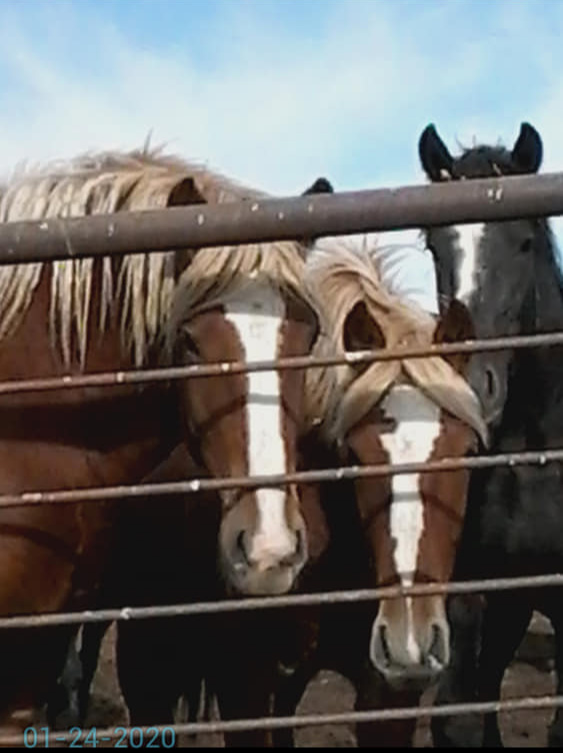
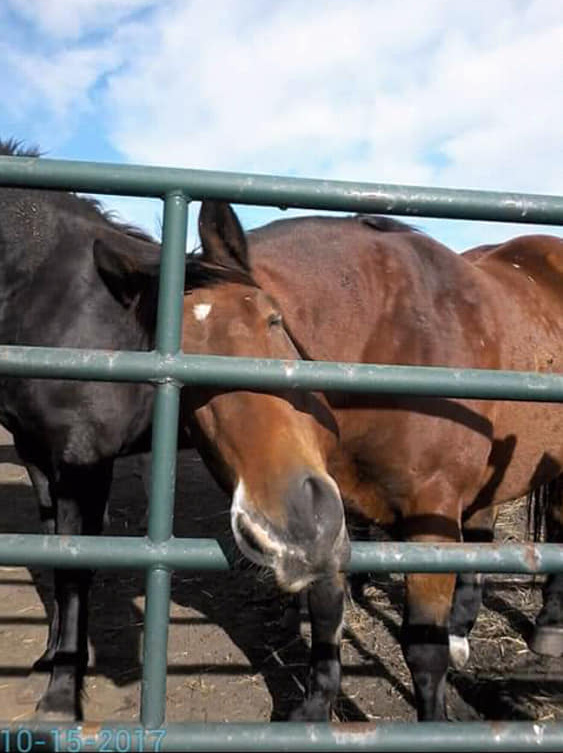
Pictures of horses in a holding pen in Alberta, Canada and destined for slaugher -- are courtesy of Christine Gallant.
*The Canadian Agri-Food Trade Alliance (CAFTA) is a coalition of national and regional organizations that support a more open and fair international trading environment for agriculture and agri-food. CAFTA’s members: Canola Council of Canada, Canadian Cattlemen’s Association, Pulse Canada, Soy Canada, Canadian Pork Council, Canadian Meat Council, Canola Growers Association, Grain Growers of Canada, Cereals Canada, Canadian Sugar Institute, Alberta Cattle Feeders Association, National Cattle Feeders Association, Barley Council of Canada. Based on domestic exports data for 2015, CAFTA’s members account 48 billion dollars of exports, representing 80% of the total value of Canadian agricultural and agri-food products exports.
**In 2012 Canada and Japan announced the launch of negotiations towards a comprehensive and high-level economic partnership agreement (EPA). The agreement known as the Canada-Japan Economic Partnership seeks to reduce and in some cases eliminated the non-tariff and tariff barriers that limits trade between the two nations.
CAFTA seeks expanded market access in Japan through the removal of import tariffs and non-tariff trade barriers.
CAFTA supports Canada’s participation in the EPA and believes it will significantly contributes to the growth and competitiveness of the agricultural sector.”
The following is page 2 of a 1,134 page report – a spread sheet:
https://www.international.gc.ca/trade-agreements-accords-commerciaux/assets/pdfs/tpp-ptp/2-D.Japan-Tariff-Elimination-Schedule.PDF (Global Affairs Canada)
“TARIFF SCHEDULE OF JAPAN (HS2012)
(Year 1 – 21 and subsequent years)
LIVE ANIMALS AND ANIMAL PRODUCTS – (NO TARIFFS with exception of 010121.290)
01.01 Live horses, asses, mules and hinnies
Horses
0101.21 Pure-bred breeding animals
010121.100 Certified as being those other than Thoroughbred,Thoroughbred-grade, Arab, Anglo-Arab or Arab-grade horses (hereinafter referred to as “light-breed horses”) in accordance with the provisions of a cabinet order
2 Other
010121.210(1) “Light-breed horses” certified as being those used for purposes other than horse-race and as being not pregnant in accordance with the provisions of a cabinet order
010121.290(2) Other 3,400,000 yen/each
0101.29 Other
010129.1001 Certified as being not “light-breed horses” in accordance with the provisions of a cabinet order
2 Other
010129.210(1) “Light-breed horses” certified as being those used for purposes other than horse-race and as being not pregnant in accordance with the provisions of a cabinet order “



The page you requested could not be found. Try refining your search, or use the navigation above to locate the post.

The Honourable Lawrence MacAulay, the current Minister of Agriculture and Agri-Food, has the power to end the inhumane export of horses by air for slaughter by enacting a regulatory amendment.
Help spread the word by sharing this email campaign with friends and family! You can also support the cause by donating—your contribution will help fund advertising efforts to raise awareness and push for change. Every action makes a difference!

Once again we’d like to thank Jann Arden for all she does to help support the banning of horse slaughter for human consumption.
American horses are routinely exported to Mexico and to Canada to be slaughtered.
Horses raised in Canada, including pet horses and discarded race horses, are slaughtered in Canada and horses are also shipped live from Canada to Japan to be slaughtered there.
The Canadian Horse Defence Coaltion is currently suing the Canadian Food Inspection Agency for blatantly ignorning international shipping regulations and allowing horses to be shipped in conditions that are inhumane.
You can save horses’ lives with one of these T-shirts @ban.horse.slaughter help stop beautiful horses from being shipped overseas for human consumption. It’s awful…



The page you requested could not be found. Try refining your search, or use the navigation above to locate the post.

The Honourable Lawrence MacAulay, the current Minister of Agriculture and Agri-Food, has the power to end the inhumane export of horses by air for slaughter by enacting a regulatory amendment.
Help spread the word by sharing this email campaign with friends and family! You can also support the cause by donating—your contribution will help fund advertising efforts to raise awareness and push for change. Every action makes a difference!
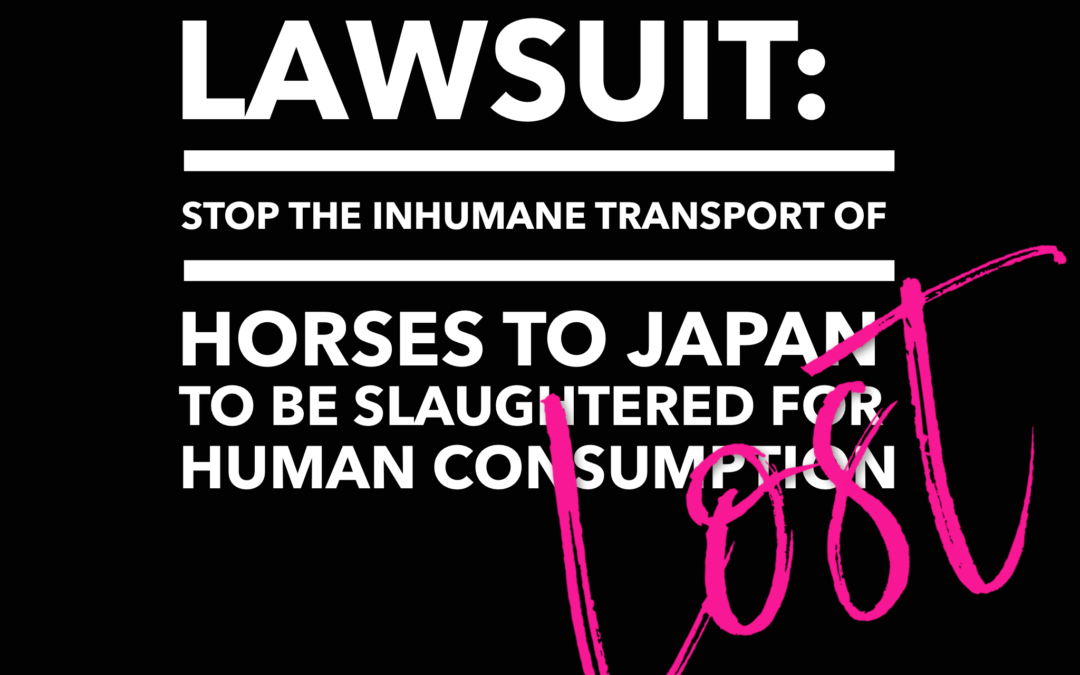
December 8, 2019:
The Canadian Horse Defence Coalition recevied notice that a decision in the ground breaking lawsuit filed against the Canadian Food Inspection Agency (CFIA) has been announced.
Unfortunately the judge decided in favour of the Canadian Food Inspection Agency.
The Canadian Horse Defence Coalition launched this lawsuit because of evidence that the Health of Animals Regulations (HAR) were being broken, when horses are transported to Japan, by air, to be slaughtered there for human consumption.
The case was heard over the last two days of October 2019 and for horse lovers across Canada, the evidence was clear. Canadian and International shipping laws are being broken.
Unfortunately the judge decided that the Health of Animals Regulations (HAR), are not the responsiblity of the Canadian Food Inspection Agency, but are the responsiblity of those exporting horses, and of the owners of the horses being exported.
The Canadian Horse Defence Coalitin is considering an appeal of Mr. Justice Keith Boswell’s decision. Further details to be announced ASAP.
December 10, 2019:
Former Canadian Food Inspection Agency Veterinarian Maureen Harper writes:
“This is a very bad decision and if left to stand, provides terrible jurisprudence for future cases. The judge basically said that the CFIA has the discretion to enforce the federal regulations as they see fit and regardless, the case should have been directed at the exporters and not the goverment.
He is just plain wrong on both accounts. This was a Writ of Mandabus case and as such, had to be lodged against the government. And there is no legal authority granting the government. discretion in how they enforce the regulations.
Finally, the judge tossed the affidavit submitted by the CHDC. He had already tossed mine months before. It’s clear to me that the fix was in to just prop up the government. So disgusting!”

“One of my bigger cases now is acting for the Canadian Horse Defence Coalition. We are suing the federal government for violating animal transportation laws.
This is a groundbreaking case as it is the first time an animal protection organization has sued the government over the way it transports animals.
People are surprised to learn that horses are being slaughtered in Canada, and perhaps even worse, they are being exported, by air, in crammed conditions, to Japan to be slaughtered for meat. Horses that may have been someone’s pet.”

December 10th, 2019. Rebeka Breder writes:
“We are incredibly disappointed to learn that we lost the horse slaughter lawsuit against the Canadian Food Inspection Agency. The court found that the CFIA does not have to follow its regulations and that it has the discretion to decide how to enforce them. We strongly disagree.
In this particular case, the law is abundantly clear that inspections of all horses must be done (by CFIA inspectors) prior to all shipments, and that all shipments must be certified as being compliant with the law. For years, these inspectors have been certifying these shipments, even though horses were being shipped contrary to the law (ie, crammed horses into small crates, instead of being separated to avoid harming each other; and not providing enough headroom). We are now considering an appeal.
I will post the decision once it is available to the public.
In the meantime, it would go a long way if you can please go to the Canadian Horse Defence Coalition website and donate some funds to help with this fight. Every little bit counts. Thank you very much.”
October 28, 2019
Horse Protection Group’s Legal Challenge Against the CFIA – October 30-31 in Vancouver
Canada’s prominent horse protection group, the Canadian Horse Defence Coalition (CHDC), will be in Federal Court this week in Vancouver, BC with Rebeka Breder from Breder Law.
Rebeka Breder will be conducting final arguments on behalf of the CHDC’s lawsuit against the Federal government at the Federal Court at 701 Georgia Street, 3rd floor in Vancouver, BC on October 30 and 31, 2019 at 9:30 AM.
In August 2018, the CHDC filed for judicial review in the Federal Court regarding live horse shipments from Canada via air, for slaughter in North East Asia.
The lawsuit challenges violations of two sections of the Health of Animals Regulations (HAR) and names the Minister of Agriculture and Agri-Food as the respondent. The Canadian Food Inspection Agency (CFIA) is responsible for the administration and enforcement of the Health of Animals Act and the HAR.
According to Rebeka Breder, “The law in regard to the live export of horses for slaughter is clear. Sections 141(8) and 142(a) of the Health of Animals Regulations state that horses over 14 hands in height (the size of a large pony) must be segregated, and horses must be able to stand in a natural position. These provisions exist to ensure the humane transport of horses, yet the CFIA consistently violates the law by allowing the overcrowding of horses and by allowing horses’ heads to touch the tops of crates, when live horses are shipped by air cargo to Japan for slaughter.”
Since 2012, the CHDC has studied conditions under which live horses are exported to Japan for human consumption. Photographic and video evidence has consistently revealed that even large draft horses have been crammed together for export purposes, sometimes as many as three or four per wooden crate, and that the ears of very tall horses have been seen to breach the netting covering the tops of crates. There is also evidence of horses dying and injuring themselves.
“This legal challenge pits David against Goliath,” says Sinikka Crosland, Executive Director of the CHDC. “But the CFIA is not above the law. The government has certain legal and ethical obligations, which cannot be swept under the rug.”
Please send inquiries to:
Rebeka Breder or Sinikka Crosland
Telephone – 604.616.4755
sinikka@defendhorsescanada.org
3 to 4 horses are loaded into crates smaller than a single horse stall;
Many horses being air shipped to Japan are large draft types over 17 hands (68”), contravening the Health of Animals Regulations;
The International Air Transport Association (IATA) sets out standards for Live Animals Regulations, stipulating that horses must be shipped individually and have sufficient head clearance;
IATA only allows exceptions for small polo ponies or Icelandic horses to be shipped in modified horse containers without partitions;
Large draft horses can be 3 times the size of such ponies, therefore contravening IATA regulations.
Canadian and international shipping regulations are being broken.
Horses are air shipped from Calgary, Edmonton and Winnipeg, Canada, to Japan and South Korea.
In 2018 over 7,000 horses were air shipped from Canada to Japan for slaughter for human consumption.
The actual number for 2018 is just shy of 9,000.
Make no mistake about it, horses destined to be slaughtered in Japan and South Korea for human consumption are not transported with the same care and respect that show horses receive.
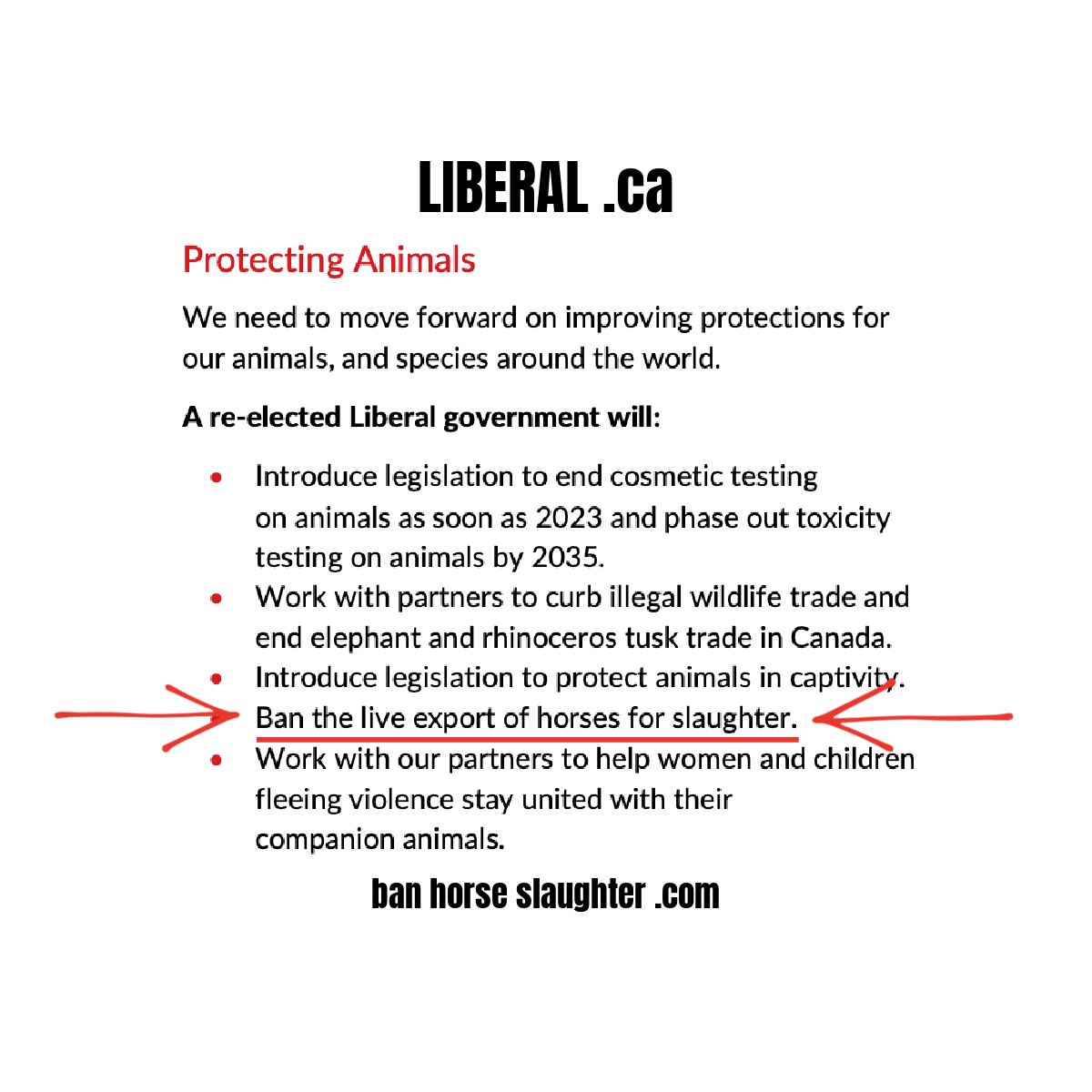




The page you requested could not be found. Try refining your search, or use the navigation above to locate the post.

The Honourable Lawrence MacAulay, the current Minister of Agriculture and Agri-Food, has the power to end the inhumane export of horses by air for slaughter by enacting a regulatory amendment.
Help spread the word by sharing this email campaign with friends and family! You can also support the cause by donating—your contribution will help fund advertising efforts to raise awareness and push for change. Every action makes a difference!